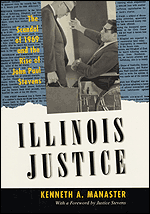A Source Document for Illinois Justice: The Scandal of 1969 and the Rise of John Paul Stevens
The document represented below is transcribed from the original. The original source document is referenced in the book Illinois Justice: The Scandal of 1969 and the Rise of John Paul Stevens by Kenneth A. Manaster, published by the University of Chicago Press.
|
PRESS RELEASE In response to inquiries as to the reasons why the Supreme Court did not convene the Illinois Court's Commission with respect to the charges attacking the integrity of the judgment entered in the case of People v. Isaacs, 37 Ill. 2d 205, the court issued the following statement: It is well established that a court has inherent power to investigate a charge that one of its judgments was obtained by fraud. It may conduct its investigation by any appropriate means: it may itself hear evidence, it may appoint a master to take evidence and report, or it may rely upon a bar association to investigate. In this instance the court felt that the most prompt, impartial and effective investigation could be conducted by a Special Commission, created by the court and given the power to compel the attendance of witnesses, with instructions to proceed with expedition and report the results of its investigation simultaneously to the Court, the Committee created by the House of Representatives pursuant to H. R. 249 and to the Illinois Court's Commission. To insure the absence of criticism which might result from this Court's selection of the members of the Special Commission, the Court appointed the incoming presidents of the Illinois State and Chicago Bar Associations and authorized them to select the other three members. Of paramount importance was the fact that the confidence of the bar and the public in the integrity of this Court not be further impaired. It seemed to the Court that an investigation by the Illinois Court's Commission might be viewed with some skepticism. The investigating agency for that Commission is the Administrative Director of the Illinois courts, who is appointed by, and subject to the directions of this Court, a circumstance which might raise questions. Secondly, the undesirability of the Commission's use at this time was further emphasized by the fact that Mr. Justice Klingbiel is presently and has been for several years, chairman of the Commission. While another member of this Court could have replaced Mr. Justice Klingbiel, this would not eliminate the problem arising from the fact that a member of this Court--a colleague of those as to whose conduct questions have been raised--was chairing the investigating body. This, again, seemed likely to be viewed with some skepticism, particularly when considered with the fact that this Court also appoints the two circuit judges who serve on the Commission. Of course, it is possible that proceedings before the Illinois Court's Commission may eventually become necessary, depending on the results of the investigation, but the problem at the moment was to select a competent, responsible investigating agency independent of the existing connections between this Court and the personnel of the Illinois Court's Commission. The court realized, of course, the inevitability of criticism of any course it chose, but the court felt the investigating method chosen was substantially less vulnerable in this respect than use of the Illinois Court's Commission at this stage. The court was also hopeful, in order that its work would not be unduly impeded, that creation of a Special Commission would eliminate the need for additional investigations which might prove largely duplicative.
|
